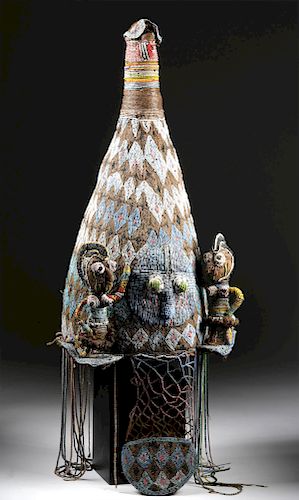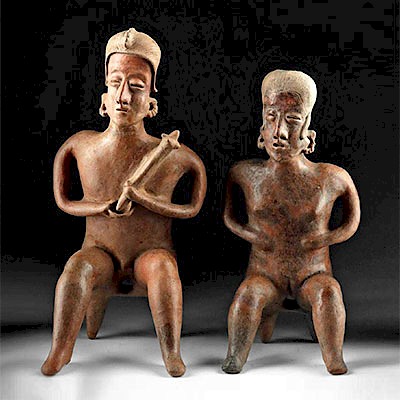Yoruba Multicolor Beaded Crown (Ade) - ca. 1960
Lot 157
About Seller
Artemis Gallery
686 S Taylor Ave, Ste 106
Louisville, CO 80027
United States
Selling antiquities, ancient and ethnographic art online since 1993, Artemis Gallery specializes in Classical Antiquities (Egyptian, Greek, Roman, Near Eastern), Asian, Pre-Columbian, African / Tribal / Oceanographic art. Our extensive inventory includes pottery, stone, metal, wood, glass and textil...Read more
Estimate:
$1,200 - $1,500
Absentee vs Live bid
Two ways to bid:
- Leave a max absentee bid and the platform will bid on your behalf up to your maximum bid during the live auction.
- Bid live during the auction and your bids will be submitted real-time to the auctioneer.
Bid Increments
| Price | Bid Increment |
|---|---|
| $0 | $25 |
| $300 | $50 |
| $1,000 | $100 |
| $2,000 | $250 |
| $5,000 | $500 |
| $10,000 | $1,000 |
| $20,000 | $2,500 |
| $50,000 | $5,000 |
| $100,000 | $10,000 |
| $200,000 | $20,000 |
About Auction
By Artemis Gallery
May 23, 2019
Set Reminder
2019-05-23 10:00:00
2019-05-23 10:00:00
America/New_York
Bidsquare
Bidsquare : Exceptional Day 2 Ethnographic Tribal Fossils
https://www.bidsquare.com/auctions/artemis-gallery/exceptional-day-2-ethnographic-tribal-fossils-4136
Day 2 of an important 2-day auction featuring exceptional ethnographic art from around the world. Today's sale will feature Pre-Columbian from the ancient americas, Native American, African / Tribal, Oceanic, Spanish Colonial, and incredible Fossils. Artemis Gallery info@artemisgallery.com
Day 2 of an important 2-day auction featuring exceptional ethnographic art from around the world. Today's sale will feature Pre-Columbian from the ancient americas, Native American, African / Tribal, Oceanic, Spanish Colonial, and incredible Fossils. Artemis Gallery info@artemisgallery.com
- Lot Description
West Africa, Nigeria, Yoruba, ca. 1960 CE. A wonderful beaded crown (ade) created for a Yoruba oba or king - of a classic conical form with a removeable bird finial atop, two attached kneeling female figures flanking a relief visage on one side, a third figure standing atop a flap on the opposite side, a beaded veil serving to cover the royal's visage, and additional beaded strands trimming the remainder. Most of the crown's body is covered with bands of repeating diamond motifs in shades of blue, brown, and pink. The upper point is adorned by horizontal strands of pink, blue, brown, yellow, and orange beads. Blue beads were particularly coveted, because the color could not be created from natural sources. In addition, this crown is lined with Ashoke cloth of wine, gold, and chocolate brown hues. Size: 13.5" W at widest point x 36" H including veil and trim (34.3 cm x 91.4 cm)
See a similar beaded crown in the Brooklyn Museum collection - https://www.brooklynmuseum.org/opencollection/objects/4813. According to the curatorial team, "Worn by an oba, or king, this crown with its beaded veil serves to depersonalize the man and instead emphasizes his office. It also protects onlookers from the danger of casting their eyes directly upon the divine presence of the oba."
Despite the fact that the Yoruba have a long history of glassmaking, the beads used to make this crown may have been imported from the British during the late 19th century. During this period, glass beads signified high status and substantial wealth. Such petite European "seed beads" were thought to be particularly special, due to their uniform size and wide variety of colors.
Provenance: private Poos collection, Overland Park, Kansas, USA; purchased directly from the artist in 2010 - One of the largest privately held quilt and textile collections in the world, the Poos Collection has evolved over 50 years and through extensive travels to allow for original or point of source acquisition. The collection includes international textiles and garments with an emphasis on West African textiles such as adire, aso oke, kente, and ewe woven prestige cloths.
All items legal to buy/sell under U.S. Statute covering cultural patrimony Code 2600, CHAPTER 14, and are guaranteed to be as described or your money back.
A Certificate of Authenticity will accompany all winning bids.
We ship worldwide and handle all shipping in-house for your convenience.
#145888Some missing beads and losses to singular strands around the periphery. Otherwise excellent.Condition
- Shipping Info
-
All shipping is handled in-house for your convenience. Your invoice from Artemis Gallery will include shipping calculation instructions. If in doubt, please inquire BEFORE bidding for estimated shipping costs for individual items.
-
- Buyer's Premium



 EUR
EUR CAD
CAD AUD
AUD GBP
GBP MXN
MXN HKD
HKD CNY
CNY MYR
MYR SEK
SEK SGD
SGD CHF
CHF THB
THB
















